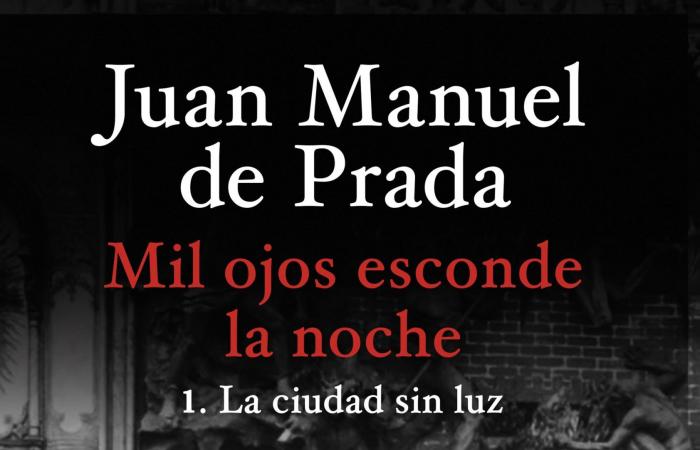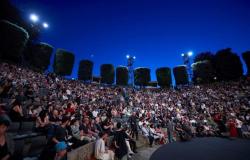Cover image: Folios of the original manuscript of the book by Juan Manuel de Prada «A thousand eyes hide the night 1: The city without light ».
When you are a mythomaniac you cannot help but suffer nostalgia for what you have not experienced all the time. Fundamentally because myths reach that category when they are no longer there. And so, one longs to attend Luther King’s dream speech in the reflecting pool in front of the Lincoln Memorial, see Sinatra drink a Dry Martini at Jill’s, travel to New York with Garci and Landa or work on the editorial staff of First in the Morning . The bad thing is that one spends so much time remembering the unlived past that we lose the present and its myths, the contemporaries, those who will truly be when the years have passed and other mythomaniacs who have not yet been born envy us for having shared a time. with them. I think I have recognized some of them and I have been lucky enough to experience them, a lot or a little. Characters who will be talked about in the next century. Pedro J., Martín Ferrand, Talese, Morante, Garci, Umbral, Alcántara… and Juan Manuel de Prada.
Because let’s make it clear from the beginning: Prada is a genius. And if not, ask your bookshelf: Planeta award at 27, Ruano award at 29, Cavia award at 36, Romero Murube award at 38. I have only seen more recognitions in the garden of Garci’s house and in the showcases of Concha Espina. To his encyclopedic culture (it is not a way of speaking) Prada adds the knowledge of all the words in Spanish, their meanings (how much money has this man lost by not competing in Pass word) and their exact placement one after the other in each phrase, and that, as Alcántara de Ruano would say, has quite a bit of merit, because there are many. And I don’t mean “Gramscian.” I am talking about “trapalandranes”, “galloferos”, “chíbiri”, “escurraja”, “organdí”, “endriagos”, “vestiglos” or “eutrapelically”. Words that Word underlines in red when you type them. And with all this he constructs an immaculate prose that places him, always from my point of view, as one of the five best columnists in Spain today and as the best and most prolific living novelist. Only Pérez-Reverte could protest my statement, so, since he is the editor of Zenda, if you are reading this it means that he thought it was good.
“Prada confronts everyone in Navales’ interviews for the newspaper Abovewhich are what Prada would have liked to do for each of them“
The day he called me to Varela (it is always at Varela) he announced the imminent conclusion of A thousand eyes hide the night, his latest novel of 1,600 pages divided into two volumes of 800 each. In it he recovers the protagonist of the prodigious The hero masks, Fernando Navales, and places him in the Falange Foreign Delegation in the recently occupied Paris (where the Germans wore gray and he wore blue… Mahón) at the head of a mission: to recruit everyone for the Movement (sorry for the capital letter). the “artistillas and feathermen” exiled in the French capital.
“It’s very beast, Luis. “My editor is going to give you hell for publishing it,” he told me, half worried and proud. The plot is fiction but the characters, places and events in which it is set are real and a textbook of contemporary history. José Félix Lequerica, González-Ruano (Ruanito), Gregorio Marañón, María Casares, the sculptor Mariano Hernández, Ana María Sagi… Prada confronts them all in Navales’ interviews for the newspaper Abovewhich are what Prada would have liked to do for each of them in their particular nostalgia for the unlived. And one discovers unknown corners of the personality of some of the main Spanish intellectuals of the mid-century. and small details, like Leguineche’s collection of pubic hair was a tribute from Berlanga to Ruano (or from Prada to Berlanga). It may be fiction, but there must not be many better-documented doctoral theses.
And if all of the above is irresistible, Prada, and here comes “the beast”, decides to obey Max Estrella when he said that “the tragic meaning of Spanish life can only occur with a systematically deformed aesthetic” and pours into the book the most dark of his mind to create a grotesque universe that Alex de la Iglesia glossed with mastery (and with that voice that makes you want him to continue reading you even if it is the Espidifén prospectus) at the presentation of the book at the Telefónica Foundation. Since the video must be uploaded to YouTube and I won’t be able to improve it, I’m going another route to see what I can find.
“It’s as if Prada had decided to merge Bohemian lights, with its cat alley and its distorting mirrors, and Beehive, with the richness of its characters“
In 2000 it was released The cell (which I take this opportunity to recommend), a film by Tarsem Singh that told the story of a psychologist (Jennifer López) who, using cutting-edge technology, was able to connect with the minds of terminally ill patients and inhabit their dreams and most hidden thoughts. . Once inside the patients’ heads, the doctor contemplated universes Dalinian with horses that remained alive after being guillotined in twenty identical sections (like the sawed woman trick) in an infirmary full of clocks, sweaty and purulent murderers who dismembered the body of a dead woman and fed her the pieces of meat to his dog, lascivious monsters with fleshy locks, like demons, women with worn, almost putrefied bodies, sutured, one-eyed, bald, like old dolls, moving to the sound of a music box mechanism that controls their wills or children who climb stairs that lead nowhere.
Well, what Jennifer López was doing had no merit. The truly worthwhile thing, for which you do have to have two balls, is to connect with the mind of Prada and contemplate everything that lives inside there.. Or, what is the same, read A thousand eyes hide the night. And since he himself writes it, the use of each word is precise and at each moment the reader feels what the writer intends: restlessness, disgust, anguish, contempt… It is as if Prada had decided to merge Bohemian lights, with its cat alley and its distorting mirrors, and Beehive, with the richness of its characters, to create a work, and here comes the judgment of a dilettante, you will forgive me, which will be at the level of the other two as one of the great masterpieces of literature in Spanish. And if you don’t believe me, ask Luis Alberto de Cuenca or Cuartango.
—————————————
Author: Juan Manuel de Prada. Qualification: A thousand eyes hide the night 1: The city without light. Editorial: Espasa. Sale: All your books.
4/5
(8 Ratings. Rate this article, please)







